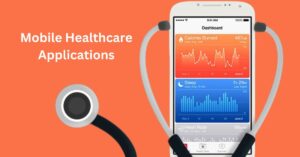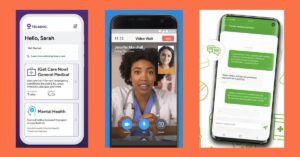Mobile Healthcare Applications
The adoption of mobile healthcare applications by medical specialists has surged, and these apps are becoming as integral to healthcare as the stethoscope. These applications, part of the broader MedTech category, extend beyond mobile platforms, including web, desktop, and embedded software systems. They enhance the patient experience and improve the workflow for physicians, healthcare professionals, and health centre managers.

Mobile healthcare apps, or mHealth apps, serve various users and purposes. They offer visit registration, e-prescription services, appointment reminders, and more for patients. For medical professionals, these apps can provide access to electronic health records (EHRs and EMRs), imaging, and visualization tools, and they can aid in the training and education of medical staff.
10 kinds of mobile healthcare applications that medical specialists frequently use

Telemedicine Apps:
- Apps like Teladoc and Amwell have become popular, especially during the pandemic, providing remote consultations and virtual care.
Medical Records Apps:
- These apps, such as FollowMyHealth, centralize patient data, allowing for easy access and transfer of medical information.
Medical Training Apps:
Platforms like Coursera and Lecturio Medical Education offer a range of courses and specializations for ongoing medical education.
Chronic Disease Management Apps:
- Apps like Medisafe and Orikami assist in managing chronic conditions by tracking medications, appointments, and vital health metrics.
Mobile Anatomy Atlases:
- E-Anatomy and similar apps provide extensive visual resources for medical professionals and students studying human anatomy.
Virtual Patient Apps:
- InSimu Patient offers a safe environment for medical students to diagnose and interact with virtual patients, honing their clinical skills.
Mobile Drug Databases:
- Apps like Epocrates support physicians with medication dosing, interactions, and pharmacology information.
Diagnosing Difficult Medical Cases:
- Figure 1 enables doctors, nurses, and students to discuss complex medical cases and share knowledge for better diagnoses.
Mobile Video Databases for Doctors:
- Platforms like Medtube provide access to a vast collection of medical videos, including examinations and procedures for learning purposes.
Mobile Apps for Surgeons:
- Touch Surgery is a surgical simulator allowing various procedures across different specialities.
FAQs about mobile healthcare applications
What are Mobile Healthcare Apps?
Mobile healthcare apps, or mHealth apps, are digital tools used in the healthcare industry for various purposes, including patient care, medical records management, telemedicine, and education for healthcare professionals.
How Do Telemedicine Apps Work?
Telemedicine apps like Teladoc and Amwell allow patients to consult with doctors remotely via phone or video calls. These apps facilitate diagnosis and treatment without the need for an in-person visit.
Can Medical Records Apps Integrate with Hospital Systems?
Many medical records apps are designed to integrate with hospital and clinic systems. They allow for easy patient data transfer and access, enhancing care coordination.
Are Medical Training Apps Effective for Continuing Education?
Medical training apps like Coursera offer courses on various medical subjects. They are increasingly recognized as effective tools for continuing education and professional development in the medical field.
How Do Chronic Disease Management Apps Help Patients?
These apps help patients manage chronic conditions by tracking medications, appointments, and health metrics, which can be crucial for diabetes or hypertension.
What is the Purpose of Mobile Anatomy Atlases?
Medical students and professionals use mobile anatomy atlases to study human anatomy. They provide extensive visual resources and are often based on comprehensive medical databases.
Can Virtual Patient Apps Replace Clinical Training?
While virtual patient apps like InSimu Patient are valuable for practice and learning, they complement but do not replace hands-on clinical training.
What Information Do Mobile Drug Databases Provide?
Mobile drug databases like Epocrates offer detailed information on medication dosing, interactions, and pharmacology, aiding physicians in medication management.
How Are Mobile Video Databases Used in Medicine?
These databases provide access to medical videos, such as videos of surgeries and procedures, for educational purposes and to share professional experiences among medical practitioners.
Are There Mobile Apps Specifically for Surgeons?
Yes, apps like Touch Surgery offer surgical simulations, helping surgeons practice procedures and refine their skills.
The benefits of mobile healthcare applications include increased convenience, improved patient engagement in the treatment process, and enhanced ability to manage, share, and analyze medical records and results. This results in not only lower costs but also, and more importantly, better treatment outcomes. The field is experiencing a boom, with the pandemic accelerating the industry’s growth and attractiveness to investors.


